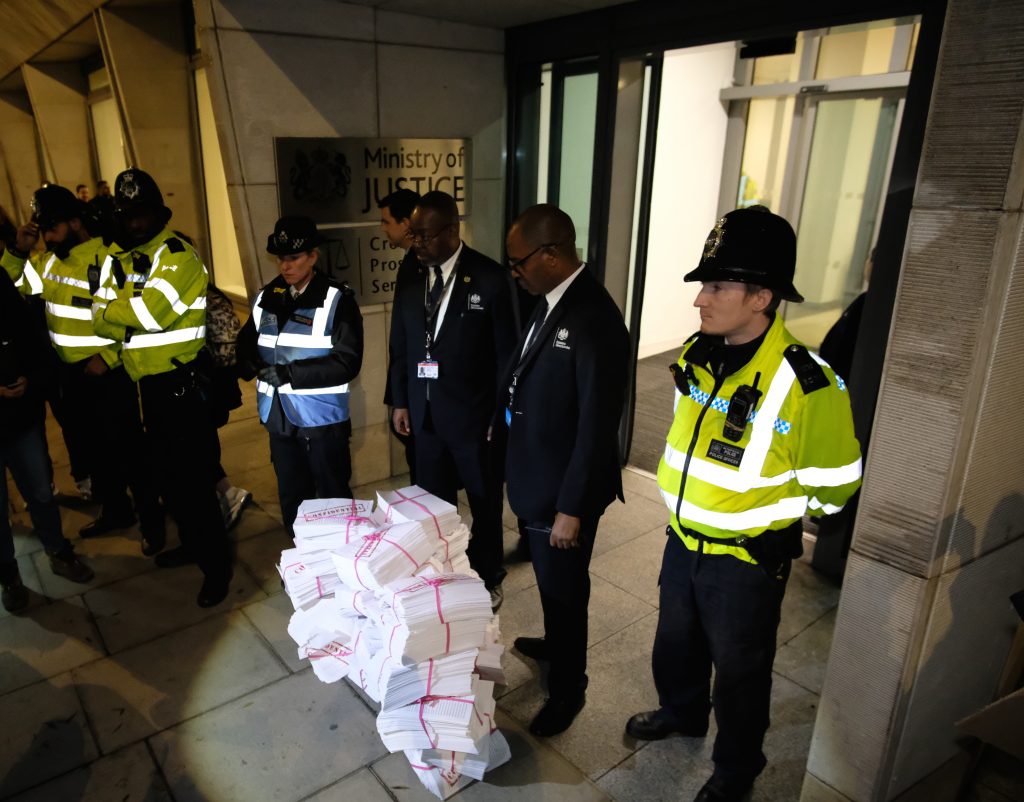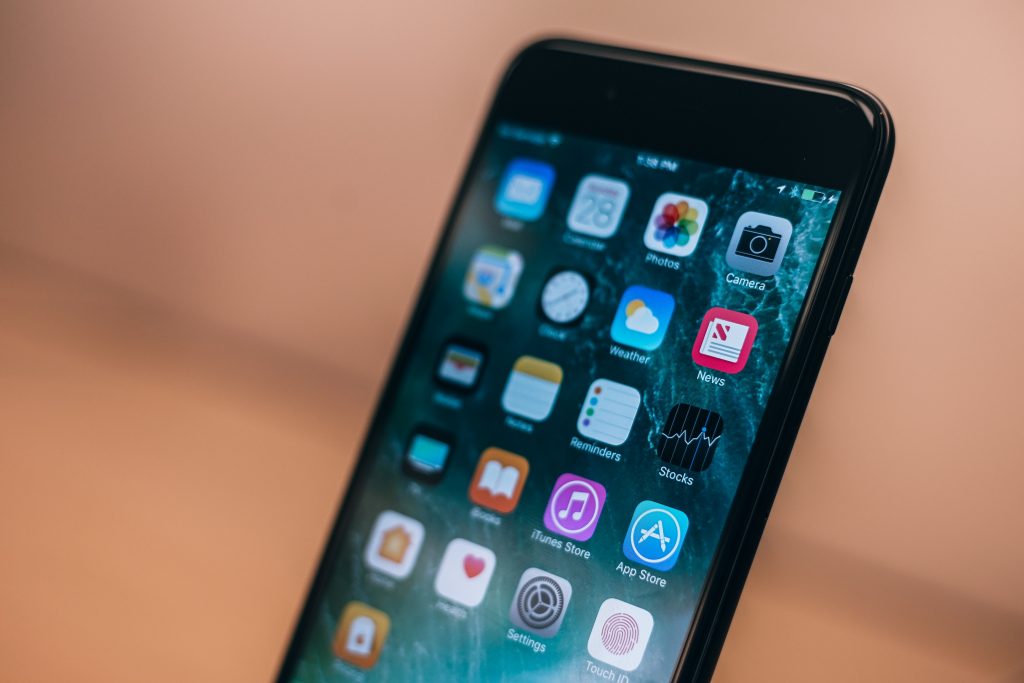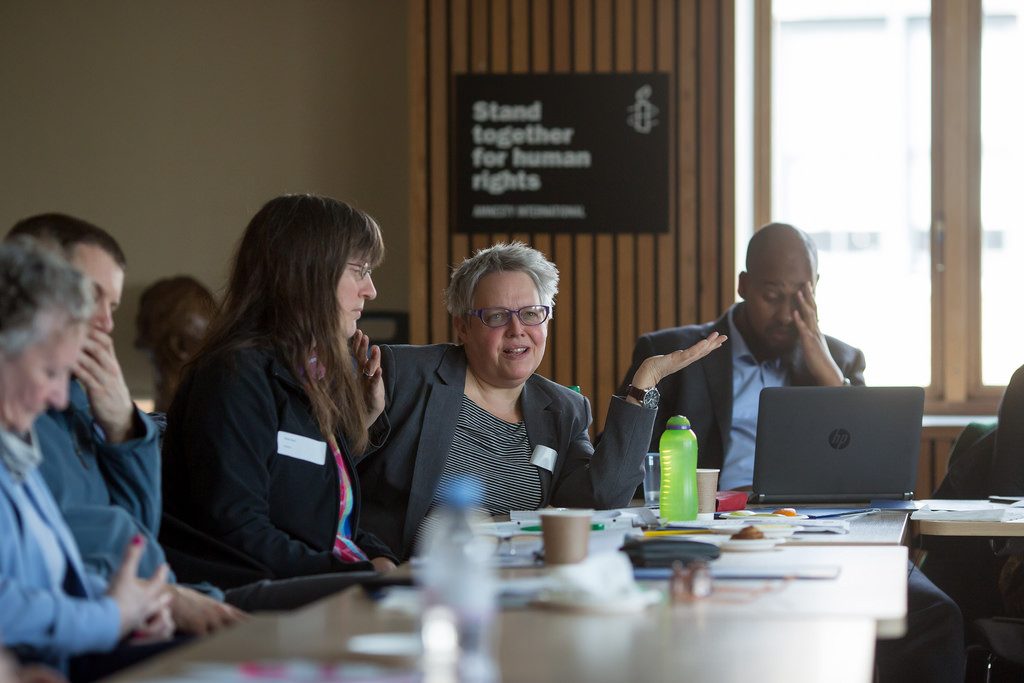Pressure is mounting on the government to reform laws which ask victims of sexual crimes to submit to police their mobile phone in order to extract all the data it contains before the Crown Prosecution Service (CPS) will consider proceeding with a prosecution. Data includes social media, web browsing activity, instant messages, location data, emails, deleted data, images, videos, audio files, apps, contacts, documents, MMS and SMS messages.
Campaigners have highlighted the practice is hugely intrusive and violates victims’ human rights, in particular the right to privacy (Article 8 of the Human Rights Convention), and leads to victims being put on trial as this data can be used by defence lawyers in court.
In November, Sisters Uncut left bundles of 30,000 documents – the equivalent of all the data on our mobile phones – at the doors of the Crown Prosecution Service to raise awareness of the issue.
Victims Not Suspects
 30,000 pages of documents, the equivalent of mobile phone data Credit: Sisters Uncut
30,000 pages of documents, the equivalent of mobile phone data Credit: Sisters Uncut
Civil liberties and privacy organisation Big Brother Watch is campaigning on the issue and its Victims Not Suspects campaign highlights that police and prosecuting services, request consent to access personal records, including school and medical records. And that this data can be stored for up to 100 years.
Big Brother Watch believes that police and prosecution services asking for victims of sexual crimes to submit highly personal and sensitive data serves only to deter them from speaking out and is ‘an affront to justice.’
Griff Ferris, Legal & Policy Officer at Big Brother Watch, told RightsInfo: “At a time when more women and men than ever are pursuing justice against sex offenders, the way victims’ privacy is treated by the police and CPS is completely unacceptable and may well breach their rights.”
“Victims of any other types of crime are not asked to put their private lives on trial. Treating rape victims like suspects is an affront to justice, undermining trust in our justice system, and deterring victims from bringing offenders to justice.”
“We urge the police and the CPS to take action to protect victims of rape from these excessive digital investigations, which are swamping police in irrelevant information and obstructing justice. This broken system must change.”
The Information Commissioner’s Office Is Investigating The Issue
 Credit: Unsplash
Credit: Unsplash
Big Brother Watch wrote to the Information Commissioner’s Office (ICO) calling for an urgent investigation into “the collection, analysis and disclosure of complainants of sexual offences’ personal information and the use of ‘consent’ statements”.
The ICO, an independent body tasked with upholding public information rights, has agreed to undertake a high priority investigation into the issue.
James Dipple-Johnston, Deputy Commissioner for Operations at the ICO, said: “As part of our investigation we believe it’s important to track the journey victims’ information takes through the criminal justice system, from allegation, through disclosure and onto any compensation application that may be made. This is to identify areas where victims’ information is most vulnerable or where processing may be excessive and disproportionate.”
Dipple-Johnston, went on to say: “Ultimately, victims need to be supported and to have confidence that they can give their evidence and information in the knowledge it will be safeguarded, used appropriately and with minimal intrusion into their privacy.”
The Victims Commissioner for England and Wales, Baroness Helen Newlove, recently raised the issue in the House of Lords and called for the introduction of defined limits and judicial oversight when police access victims’ mobile phone data.
Newlove said: “Are there any plans to review and amend the Criminal Procedures And Investigations Act 1996 to include the requirement to seek the complainant’s consent in relation to their digital evidence and personal records with clear and defined limits and effective judicial oversight because many victims already do not come forward and I don’t want any more not to come forward because of what goes on in procedure.”
Overhaul Of ‘Stafford Statements’ Required
 Harriet Wistrich Credit: Flickr
Harriet Wistrich Credit: Flickr
Campaigners are calling for a review and overhaul of the use of ‘Stafford statements’ in allegations of serious sexual offences. A Stafford statement is a consent-style form given to victims to allow police and prosecutors to access their personal information.
According to the ICO, ‘A Stafford statement can give wide-ranging, blanket consent for police to access detailed and sensitive information, including copies of a victim’s medical, education, psychiatric, social service and family court proceedings records. These records can date from many years prior to the incident under investigation.’
However, Stafford statements can be signed in the aftermath of the crime when the victim is in shock and unclear as to what they are consenting to and why. There have been occasions when victims of serious sexual attacks refusing to consent to their data to be handed to the CPS has resulted in the prosecution of the crime being dropped.
In 2016, Kent Police were fined £80,000 by the Information Commissioner for a serious breach of the Data Protection Act 1998 for handing the entire contents of a domestic abuse victim’s mobile phone to her partner’s lawyer, who passed it to the suspect.
Leading lawyer, Harriet Wistrich, founder of the Centre for Women’s Justice, who represented two victims of taxi rapist John Warboys in a successful legal challenge to the Parole Board’s decision to release him in January 2018, told The Telegraph there’s a ‘real problem’ with Stafford Statements and victims being put on trial.
Wistrich said: “There is evidence that there’s a real problem with rape victims, including teenagers, being told to hand over their phones.
“We are hearing from rape crisis groups that women are refusing to do this as they fear police go right back through all their messages and data, practically to birth. The use of Stafford statements is effectively putting the victims on trial.”
Campaigners believe victims being put on trial through the intrusive extraction of victims data by police and prosecuting services is a major contributing factor to the steep decline in rape cases being prosecuted. The CPS charged 849 fewer defendants in 2017-18 than the previous year, a fall of 21.1 per cent, according to figures from the CPS’s Violence Against Women and Girls report.







